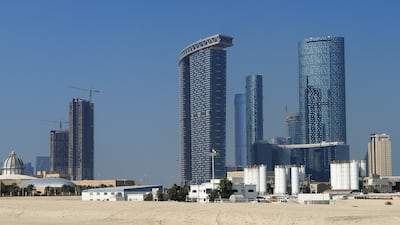The UAE and the UK can team up to become leaders in the booming hydrogen sector through a “broad” collaboration involving policy, innovation, trade and investment, according to a report jointly published by the World Green Economy Organisation (WGEO) and UAE-based consultancy Zest Associates.
Existing agreements between the two countries could be focused on hydrogen to “match the scale of investment required to achieve net zero”, the report said.
Hydrogen, which can be produced from both renewable energy and natural gas, is expected to play a key role in the coming years as economies and industries transition to a low-carbon world to mitigate climate change.
It comes in various forms, including blue, green and grey. Blue and grey hydrogen are produced from natural gas, while green is derived from splitting water by electrolysis. The size of the global hydrogen industry is expected to hit $183 billion by 2023, up from $129bn in 2017, according to Fitch Solutions.
By 2050, hydrogen is estimated to deliver more than $8.7bn annually to the UAE economy, and $14.8bn (£13.7bn) to the UK, as well as more than 100,000 new jobs in each country if adoption is high, WGEO said.
Hydrogen is expected to account for 12 per cent of global energy use and 10 per cent of carbon emission reductions by 2050, driven by the urgency of climate change and countries’ net-zero commitments, the International Renewable Energy Agency said in a January report.
“We have seen strong actions and willingness to cooperate from the public and private sectors in both countries, but to fully realise the economic and environmental potential of green hydrogen, more and faster measures must be taken”, said Mohammed Al Tayer, chairman of WGEO.
Last year, Abu Dhabi sovereign wealth fund Mubadala signed a £10 billion ($11.31bn) agreement at Downing Street to expand the UAE-UK Sovereign Investment Partnership.
Over the next five years, the UAE-UK SIP plans to drive a significant increase in investment across three sectors: technology, infrastructure and energy transition.
In September 2021, the UK Department for Business, Energy and Industrial Strategy and the UAE Ministry of Industry and Advanced Technology signed a preliminary agreement to partner collaboration on a broad range of areas. These included the development of life sciences, space, hydrogen and wider industrial sectors, including supply chain resilience, regulations and standards.
Last month, the MoEI signed an agreement with GHD in partnership with the Germany-based Fraunhofer-Gesellschaft to develop its National Hydrogen Strategy.
It will help to establish the UAE's hydrogen vision and inform its policy decisions as one of its energy-mix diversification strategies and net-zero targets by 2050.

